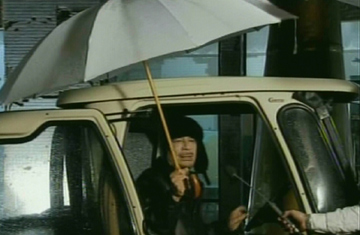
An image grab taken on February 22, 2011, off the Libya's state television station shows Libyan leader Muammar Gaddafi holding an umbrella as he sits in the back of a vehicle in what state television reported was a live broadcast from the strongman's home.
Libya tipped towards all-out civil war on Tuesday, as the chaos from a week-long revolt deepened, with reports of bodies lying in the streets of the capital Tripoli and parts of eastern Libya entirely out of the control of Muammar Gaddafi's regime. With Gaddafi's hold on power looking increasingly tenuous, human-rights groups and exile organizations say it is now impossible to calculate how many have been killed during the past week, although their estimates easily exceed 400.
With events accelerating, Gaddafi's 42 years in power appear to be unraveling at lightning speed, buckling under several pressure points: Deep divisions within the military, which has launched air, naval and ground attacks against unarmed protesters; a stampede of defections among top officials; and a collapse of the regime's credibility internationally, let alone among many of its own citizens.
As rumors intensified that Gaddafi had fled the country, the leader appeared for a few seconds on state-run Libyan television at about 1 a.m. Tuesday morning. He appeared to be in front of his compound in Tripoli's western suburbs, which still bears the damage done to it by a U.S. aerial bombardment in 1986, the scars acting as a show of defiance against those who have long wished to see the back of him. I am in Tripoli not in Venezuela," he said as he climbed into a vehicle, awkwardly holding a huge gray umbrella.
That sneering shrug towards his enemies was classic Gaddafi. Yet while the Brotherly Leader and Guide of the Revolution — as he is officially known in Libya — might still be in Tripoli, the city which has been his stronghold for four decades is now in chaos. Associated Press reported on Tuesday morning that numerous bodies lay on Tripoli's streets, after security forces again opened fire on anti-government protesters.
The capital has sunk into turmoil since Sunday, and only got worse on Monday, after Gaddafi's son Saif al-Islam — long the favorite among Western leaders to succeed Gaddafi — gave his own 1 a.m. speech in which he warned that the military would crush the protesters "to the last bullet." As his speech ended, thousands of protesters poured into Tripoli's Green Square — a huge open area in the heart of the city, ringed by sidewalk cafés and Libya's old fortress museum, a block from the seafront. Chanting their fury at Saif's threats of violence, the protesters confronted men who drove into the square in a convoy of about 50 cars and opened fire with machine guns, according to eye-witness accounts told to the Canada-based Libyan Youth Movement, an anti-government group which has sprung up during the past month and now acts as a conduit for information from those inside Libya. "We have confirmed 250 deaths on Monday in Tripoli alone," Ayat Mneina, a 23-year-old Libyan-Canadian student in Winnipeg, told TIME Monday night. "We have called the hospitals, and got that figure from doctors." If it is accurate, the total death toll for the past week stands at about 550.
Although the massacre of demonstrators in Tripoli — and in and around Libya's second-biggest city Benghazi, about 600 miles east of the capital — were designed to stanch the nascent rebellion and shore up Gaddafi's rule, by Tuesday they seemed almost certain to have backfired. Western leaders and members of the Arab League (of which Gaddafi currently holds the rotating chairmanship) expressed outrage on Monday at the assaults. The Arab League called an emergency meeting for Tuesday to discuss Gaddafi's brutal crackdown.
At home too, Gaddafi appears increasingly isolated. On Monday afternoon, two senior Air Force colonels flew Mirage fighter jets to Malta, where they claimed political asylum, saying they had rejected Gaddafi's orders to fire live ammunition on protesters. That night, Maltese officials refused to allow the Libyan ambassador to meet the two fighter pilots.
In an show of contempt for Gaddafi, which would have been unthinkable just a week ago, numerous diplomats have quit their jobs since Sunday, including the Libyan ambassadors to Indonesia, Bangladesh, and Poland, as well as several lower-level diplomatic officials. Nine staff members in the London embassy resigned, and joined the huge anti-Gaddafi demonstration outside the building. "After this bloodshed you cannot stay, you cannot be in such a situation," Ali al-Essawi, who resigned on Sunday as Libya's ambassador to India, told Al Jazeera on Tuesday morning. "Before, there were reforms, there was some progress. You could feel hope. But after this, there is frustration."
